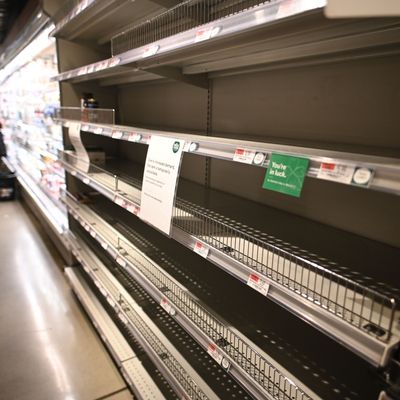
Shoppers stocking up on supplies have overwhelmed grocery stores across the country over the past few days, as schools close, employees are sent home, and cities and states adopt drastic social distancing measures. In New York, shoppers cleared shelves of pasta, rice, canned goods, and toilet paper, braving hours-long waits, confrontations in poultry aisles, and hoarders wheeling extra-large suitcases filled with provisions.
At least 60 people waited on line Friday morning to get into the Park Slope Food Coop, which imposed limits on the number of people allowed inside. Despite the atmosphere on the sidewalk, shoppers inside the coop were pleasantly surprised to find what they needed, save for hand sanitizer. “The coop is doing a heroic job of keeping the shelves stocked,” said member Danny Hellman. “I was at Wegmans the other night and their pasta shelf is completely empty.”
The line at a Trader Joe’s in Kips Bay was around the block before the store’s doors opened Friday morning at 8 a.m., according to the Post. The Costco in Sunset Park was so busy it had to shut the main gate to the parking lot. Target, Duane Reade, and even bodegas are struggling to keep pace.
“It’s a little crazy,” said Helen Gurrera, the president of Citarella, a gourmet market with eight locations in New York and Connecticut. According to Gurrera, sales are up 50 percent this week at Citarella’s three Hamptons locations, where many New Yorkers have hunkered down in summer homes. “People aren’t buying just pieces of cheese, they’re taking the entire wheel,” said Gurrera.
Business at Dorian’s Seafood on the Upper East Side has jumped by about 25 percent. On Thursday, Lobel’s butchery filled a $10,000 order to a brownstone that included 100 steaks, 100 racks of lamb, 100 chicken breasts, and more. “We’re a little overwhelmed,” said store co-owner Mark Lobel. “It’s busier than the holidays. The only thing I can compare it to is after 9/11. One woman in Florida called and said she was having someone turn her refrigerator on in Rhode Island just so she could have more freezer space.”
The boom in business isn’t necessarily welcome, according to the Food Industry Alliance. “What’s unique about this is that with a storm like Sandy or a winter storm, it’s a relatively short period of time,” said Jay Peltz, SVP of government relations for FIA. “Now, people have no idea when things will return to normal. They don’t know if this is going to help or hurt them in the long run.”
Grocery stores have systems in place to deal with supply-chain shortages during crises and can effectively redirect inventory to regions hit by natural disasters. COVID-19, however, presents potential breaks in regional supply chains across the country. What that means, according to Douglas Baker, vice-president of industry relations at the Food Industry Association, is that the variety of brands might slim. “We have wines, meats, and cheeses from Italy that might be affected,” said Baker, “but people are still going to be able to buy spaghetti.”
Even though the public health crisis will likely go on for months, food shoppers might adjust to the new normal and start being more measured in their purchasing habits. According to Baker, shoppers in containment areas, like Washington State and New Rochelle, have already seen panic shopping abate and return to some level of normalcy. Manufacturers, distributors, and retailers are working to make sure grocery stores remain open and stocked, Baker said. “We’re in unprecedented times, consumers need to be patient.”
We’re committed to keeping our readers informed.
We’ve removed our paywall from essential coronavirus news stories. Become a subscriber to support our journalists. Subscribe now.






























